Murdoch Mysteries: Season 4 Blu-ray Movie
HomeMurdoch Mysteries: Season 4 Blu-ray Movie 
Acorn Media | 2011 | 624 min | Not rated | May 29, 2012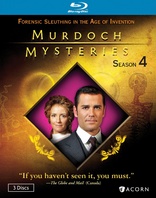
Price
List price:Amazon: $37.73 (Save 37%)
Third party: $37.73 (Save 37%)
Temporarily out of stock.
Movie rating
7.6 | / 10 |
Blu-ray rating
| Users | 0.0 | |
| Reviewer | 4.0 | |
| Overall | 4.0 |
Overview
Murdoch Mysteries: Season 4 (2011)
Detective William Murdoch of the Toronto police department pushes the boundaries of Victorian-era criminal science to solve baffling murders in this smart, compelling series. Season 4 pits the kindhearted cop against a would-be vampire, a costumed killer, and ruthless mobsters, inspiring him to whip up a slew of innovative crime-fighting techniques along the way. But while Murdoch nabs the culprits with the help of politically ambitious Inspector Thomas Brackenreid and eager Constable George Crabtree, he struggles to subdue his feelings for former sweetheart Dr. Julia Ogden.
Starring: Yannick Bisson, Hélène Joy, Thomas Craig, Jonny Harris, Georgina ReillyDirector: Megan Follows, Yannick Bisson, Norma Bailey, T.W. Peacocke, Katie Boland
| Period | Uncertain |
| Crime | Uncertain |
| Mystery | Uncertain |
| Action | Uncertain |
Specifications
Video
Video codec: MPEG-4 AVC
Video resolution: 1080p
Aspect ratio: 1.78:1
Original aspect ratio: 1.78:1
Audio
English: Dolby Digital 2.0 (256 kbps)
Subtitles
English SDH
Discs
50GB Blu-ray Disc
Three-disc set (3 BDs)
Packaging
Slipcover in original pressing
Playback
Region A (B, C untested)
Review
Rating summary
| Movie | 4.5 | |
| Video | 4.5 | |
| Audio | 3.5 | |
| Extras | 1.5 | |
| Overall | 4.0 |
Murdoch Mysteries: Season 4 Blu-ray Movie Review
History, Science, Romance—and Murder
Reviewed by Michael Reuben May 24, 2012Keeping pace with its DVD sets of Murdoch Mysteries, Acorn Media is releasing the fourth season on Blu-ray, just as the Blu-ray of Season 3 accompanied the DVDs. The only remaining gap in the series' Blu-ray version is Season 2. Presumably that will be filled at some point before the release of Season 5, which just finished airing in Canada. For anyone unfamiliar with this unique combination of police procedural, costume drama and science fiction, I strongly urge you not to read past the first screenshot. Each of the thirteen episodes in a season of Murdoch Mysteries tells a self-contained story, but the seasons feature long-term arcs for major characters, and each season builds upon the earlier ones. It's impossible to write about a later season without spoilers for a newcomer. For a spoiler-free introduction to the intriguing world of Murdoch Mysteries, see the Season 1 review. One non-spoiler item must be mentioned here. Murdoch Mysteries is the favorite TV show of current Canadian Prime Minister Stephen Harper and his daughter, Rachel. When the show's producers received word that the Prime Minster wanted to visit the set with his daughter, they countered with a better offer: How about an appearance on the show? In a much-publicized cameo, Prime Minister Harper appeared in episode 7 of Season 4 as a constable in Detective Murdoch's station, who is shown to be ignorant of current events and a poor judge of hockey players (Harper himself being a fan with a famously encyclopedic knowledge of the sport). A special feature on the Season 4 discs documents the Prime Minister's day on the set and replays his scene, which is also widely available on YouTube and other internet sources. Unfortunately, you won't find Prime Minister Harper's cameo in the version of episode 7 that appears on this Blu-ray set. The episode plays with an alternate take featuring a different actor. No explanation is offered, and whatever the reason for the change, it's incongruous to emphasize in extras something that simply isn't there in the main feature. Fortunately, the episode itself remains intact.

Season 3 of Murdoch Mysteries ended on a sort of cliffhanger, as the brilliant but emotionally reserved Det. William Murdoch (Yannick Bisson) finally resolved to declare his love for Dr. Julia Ogden (Hélène Joy), the beautiful Toronto coroner who is his intellectual equal. Murdoch even bought an engagement ring. But Dr. Ogden, having concluded from Murdoch's long silence that the two of them weren't meant to be, had accepted the offer of a post as chief of surgery at a children's hospital in Buffalo, and Murdoch arrived at the station just in time to watch her train recede into the distance. As Season 4 opens some months later, Murdoch has buried himself in work, but all is not well at the Toronto constabulary. Those who work closely with him, like the stalwart Constable Crabtree (Jonny Harris), notice that the usually courtly detective has become distracted and irritable. It doesn't help that the replacement coroner, Dr. Francis (recurring guest star Paul Rhys), is the polar opposite of the departed Dr. Ogden. Recruited at considerable effort by Murdoch's boss, Inspector Brackenreid (Thomas Craig), from Scotland Yard, where Francis was considered a "top man", the new doctor carries with him a typical Englishman's disdain for "colonials". Dr. Francis has no patience with Murdoch's barging into his morgue, which Murdoch is accustomed to treating as an extension of his office, nor does he appreciate being routinely summoned to crime scenes, where, in his opinion, a coroner has no business. Meanwhile, Murdoch, who is used to priority treatment from the coroner's office, grows impatient when his autopsy reports take longer than he thinks they should. The two men clash constantly, and neither appears willing to give ground, to the consternation of the Inspector, who simply wants peace and a smoothly functioning police station. Murdoch's conflicts with Dr. Francis prove dramatically useful, because they supply an excuse to keep Dr. Ogden in the picture. In one episode, Murdoch consults her surreptitiously by telegram. In another, when personal matters bring his erstwhile colleague back to Toronto for a short visit, Murdoch sneaks her into her former office for a covert examination of a murder victim. (Dr. Francis catches them, and there's hell to pay.) In a case of turnabout, episode 3, "Buffalo Shuffle", finds Murdoch urgently summoned to Dr. Ogden's new place of employment, because she believes a patient has been murdered, and the circumstances are so delicate that local authorities can't be alerted. (The Children's Hospital of Buffalo is a charity, and a major fund-raising drive is in progress, for which even a hint of scandal would be fatal.) Dr. Ogden asks Murdoch to solve the murder in an undercover capacity, which, of course, he does. That Murdoch and Julia have unfinished business is obvious to just about everyone except the two of them. Eventually, with some prodding from third parties, an arrangement is worked out that allows Julia to return to Toronto for the long term. But it doesn't come without a cost. The inability of Murdoch and Julia to express their true feelings for one another is the main overarching plot in Season 4, and its resolution in the final scenes of the last episode is, if anything, more surprising than that of Season 3, when the doctor's train left Toronto. Less weighty arcs await Crabtree and Brackenreid. The Inspector is approached by a coalition of wealthy Toronto citizens who want to back him in a campaign for alderman. They're attracted by his law-and-order credentials, but what they really want is someone who will tip the balance on the city council in favor of a proposed new subway system. The 1890s saw an international boom in subway construction, and Toronto's movers and shakers didn't want their city left behind. Brackenreid has no trouble embracing the subway. What throws him is the makeover demanded by his campaign manager as the election grows more competitive: new clothes, elocution lessons, a less "salty" vocabulary. But Brackenreid reaches a genuine crossroads when the wealthiest of his patrons tries to dictate how the Inspector should handle his cases for the sake of favorable headlines. Brackenreid isn't that kind of cop. Constable Crabtree has decided to write a novel, of which we get to hear bits and pieces throughout the season. It seems to be a bizarre hybrid of detective story, political thriller and science fiction. Maybe it's brilliant; then again, it could be utter twaddle. With Crabtree you're never entirely sure. Meanwhile, Murdoch continues to exercise his scientific ingenuity to solve baffling cases. "You're gonna build something, aren't you?" says the Inspector apprehensively, when Murdoch starts talking in riddles. During Season 4, Murdoch's inventions include a primitive form of fax machine (using the telegraph), a basic sonar device, security cameras and a prototype of the "dye pack" now commonly used to foil bank robbers. And, of course, "fingermarks", blood analysis and other now-standard forensic techniques continue to play their part. The series creators have lost none of their ingenuity in mining historical events for storylines. Episode 2, "Kommando", begins with the murder of a Canadian soldier stationed at nearby Fort York. The soldier was part of a contingent recently returned from a training mission in Africa, where tensions are mounting between the British and the Boers (who were Dutch descendants). Against the shadow of the First Boer War (in 1880) and the coming Second Boer War (which began in 1899), Murdoch begins to suspect that something untoward happened in Africa. He's right, of course. Episode 9, "The Black Hand", involves Murdoch's discovery of the machinations of a secret criminal organization with its roots in Sicily. In a few decades, that same organization would spawn the criminal enterprise familiar to moviegoers from The Godfather films. (The episode is also notable for the reappearance of a woman from one of Murdoch's past adventures.) Episode 11, "Blood Lust", deals with the vampire craze sparked by a then-recent novel by Bram Stoker entitled Dracula (think of it as the original Twilight). When teenage girls at a boarding school tell tales of being led into the woods at night by a handsome and seductive figure, then one of them ends up dead and missing a few pints of blood, Murdoch must deploy his scientific skills to find an explanation other than romantic notions of the undead. The most intriguing historical episode occurs mid-season in episode 7, "Confederate Treasure". Human remains are found buried in a landfill near Toronto harbor, and evidence dates the body to the time of the American Civil War. When additional evidence suggests that the victim may have been involved in a plot to support the Confederacy with gold from the Canadian treasury, Murdoch is drawn into a world of shadowy plots and threats to national security. For a U.S. viewer, one of the episode's most fascinating elements is the perspective on the Civil War from the outside: not as a clash of values or ideologies, but as an opportunity to exploit a period of American weakness. Apparently that's how a few Canadian pragmatists saw it in the 1860s, and the current Canadian government fears dire consequences if the truth comes out almost forty years later. By the end of this twisty saga, Murdoch is advised by the highest authority that he's done a great service to his country. He just can't tell anyone about it.
Murdoch Mysteries: Season 4 Blu-ray Movie, Video Quality 
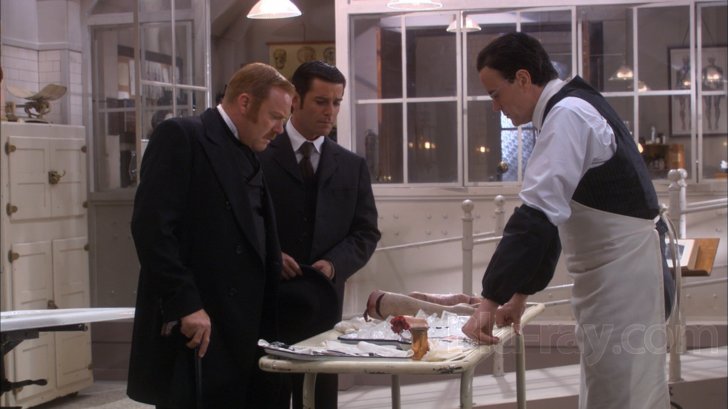
Murdoch Mysteries continues to be shot on hi-def video, and the quality of the photography has improved with subsequent seasons. The video noise that I noted as an occasional distraction on the Season 1 discs was entirely absent on Acorn Media's 1080p, AVC-encoded Blu-rays for Season 4, but the depiction of 1890s Toronto (and, for one episode, Buffalo) remains as brightly lit, detailed and colorful as always. The show continues to be photographed in a style that's the opposite of a typical sepia-toned period piece, which strikes an appropriate visual balance with the city's dirt roads, horse-drawn carriages and vintage clothing. Murdoch's world is part of history, but it's also on the cusp of modernity. Black levels on these discs were particularly good, I thought, and this is especially noticeable in several episodes, including episode 7, "Confederate Treasure", which includes a boat ride on a lake in the dead of night; episode 10, "Voices", set in a convent; and the final episode of the season, "Murdoch in Wonderland", which involves a Lewis Carroll-themed costume party and features several scenes of nightmares and hallucinations with solid black backgrounds.
Murdoch Mysteries: Season 4 Blu-ray Movie, Audio Quality 
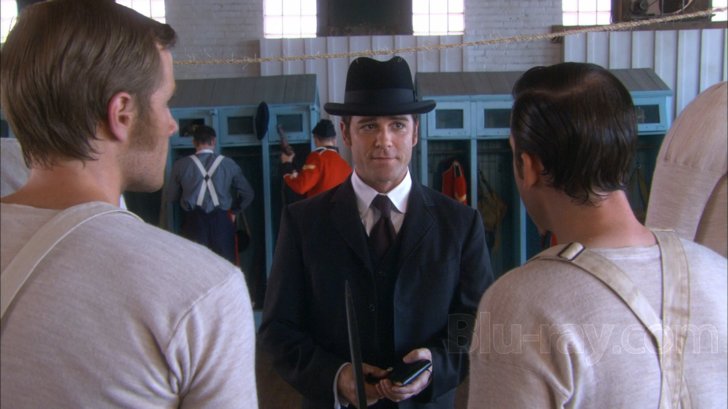
As with Season 1, the printed jacket copy lists PCM 2.0, but the actual sound format is Dolby Digital 2.0 at 256 kbps. Having used PCM on its first-issued set of Murdoch Blu-rays, Season 3, Acorn has apparently decided that DD is good enough. Having watched all of the seasons issued on Blu-ray to date, I have to say that I don't think viewers will notice the difference unless they convince themselves beforehand. Murdoch's stereo soundtrack is a serviceable one, with clearly rendered dialogue, effective underscoring by Robert Carli, essential sound effects for storytelling, and a few signature sounds to indicate scene transitions (notably a light bulb illuminating). Lossless encoding would be preferable, but I'm not sure how much it would really add to the experience.
Murdoch Mysteries: Season 4 Blu-ray Movie, Special Features and Extras 
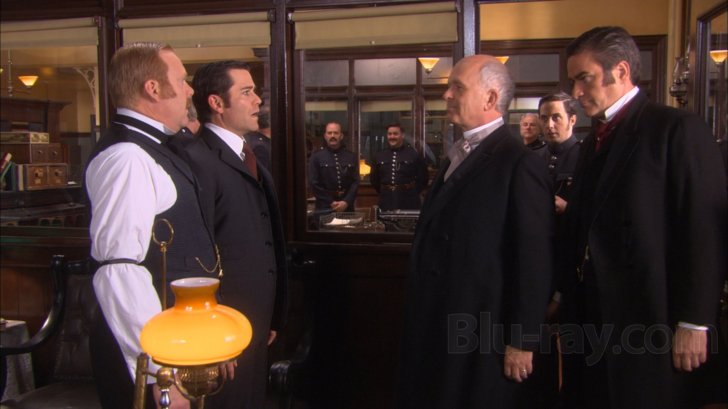
- Yannick Bisson Directs (disc 1) (SD; 1.78, non-enhanced; 5:48): Bisson made his directorial debut with episode 3 of this season, "Buffalo Shuffle". Though third in broadcast order, it was the first to be filmed. This featurette includes interviews and footage from the location.
- Prime Minister Visit (disc 2) (SD; 1.78, enhanced; 2:34): This featurette chronicles the visit of Canadian Prime Minster Stephen Harper and his daughter, Rachel, to the show's set. It also contains the entirety of Harper's scene, which is helpful, because, as noted previously, the scene has been replaced with an alternate version in episode 7.
- The Making of Season 4 (disc 3) (SD; 1.78, non-enhanced; 6:18): The footage for this behind-the-scenes featurette was obviously shot early in the filming of Season 4, because Hélène Joy says she does not yet know how the Ogden/Murdoch relationship will turn out. Though brief, the piece is entertaining.
- Alternate Love Letters (disc 3) (HD, 1080p; 1.78; 2:28): These are alternate scenes for episode 13 and should not be viewed until after the episode has been watched.
- Additional Trailers: At startup, disc 1 plays trailers for Acorn Media, Vera and Going Postal. These can be skipped with the chapter forward button and are not otherwise available once the disc loads.
Murdoch Mysteries: Season 4 Blu-ray Movie, Overall Score and Recommendation 
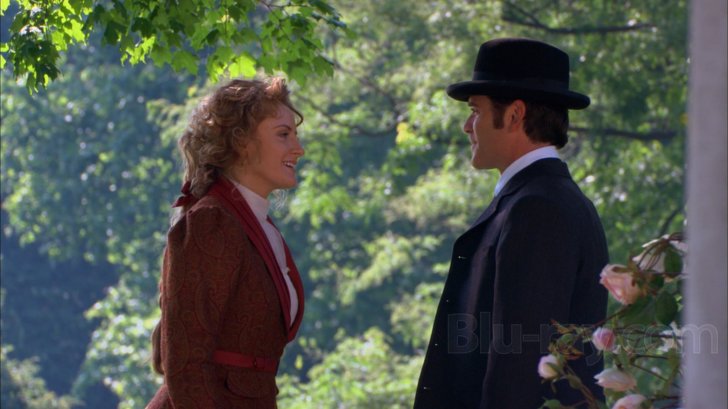
Murdoch Mysteries has grown richer and more creative as the seasons have progressed, and the characters have acquired additional depth and dimension. The show has a style and an atmosphere unlike anything I've seen on either American or British television. I suppose that's what Prime Minister Harper means when he says that Murdoch Mysteries is an "authentic" Canadian show. I eagerly await the Blu-rays of the remaining seasons. Highly recommended.
Other editions
Murdoch Mysteries: Other Seasons

Murdoch Mysteries: Season 1
2008

Murdoch Mysteries: Season 2
2009

Murdoch Mysteries: Season 3
2010

Murdoch Mysteries: Season 5
2012

Murdoch Mysteries: Season 6
2013

Murdoch Mysteries: Season 7
2013-2014

Murdoch Mysteries: Season 8
2014-2015

Murdoch Mysteries: Season 9
2015-2016

Murdoch Mysteries: A Merry Murdoch Christmas
2015

Murdoch Mysteries: Season 10
2016-2017

Murdoch Mysteries: Once Upon a Murdoch Christmas
2016

Murdoch Mysteries: Season 11
2017-2018

Murdoch Mysteries: Home for the Holidays
2017

Murdoch Mysteries: Season 12
2018-2019

Murdoch Mysteries: Season 13
2019-2020

Murdoch Mysteries: Season 14
2021

Murdoch Mysteries: Season 15
The Artful Detective
2021-2022

Murdoch Mysteries Season 16
2022-2023

Murdoch Mysteries: Season 17
The Artful Detective
2023-2024

Murdoch Mysteries: Season 18
The Artful Detective
2024-2025

Murdoch Mysteries Season 19
2025-2026
Similar titles
Similar titles you might also like
(Still not reliable for this title)

Poirot: Murder on the Orient Express
2010

The Raven
2012

The Night of the Generals
Limited Edition to 3000 - SOLD OUT
1967

Murder on the Orient Express 4K
50th Anniversary Edition
1974

Grantchester: Season Four
Masterpiece Mystery
2019

Copper: Season One
2012

Twisted
2004

Endeavour: Series 2
Masterpiece Mystery | Full UK-Length Edition
2014

Murder by Decree 4K
1979

Sherlock Holmes 4K
2009

Where the Truth Lies
2005

Foyle's War: Set 8
2014

Miss Fisher's Murder Mysteries Series 1-3 Collection
2012-2015

The Scarlet Claw
Sherlock Holmes
1944

Sherlock Holmes Faces Death
1943

In the Cut
20th Anniversary Uncut Director's Edition
2003

Miss Marple: Volume 1
The Murder at the Vicarage / The Body in the Library / The Moving Finger / A Murder is Announced
1984-1986

The Bletchley Circle
2012

Miss Fisher and the Crypt of Tears
2020

The Connection
La French
2014